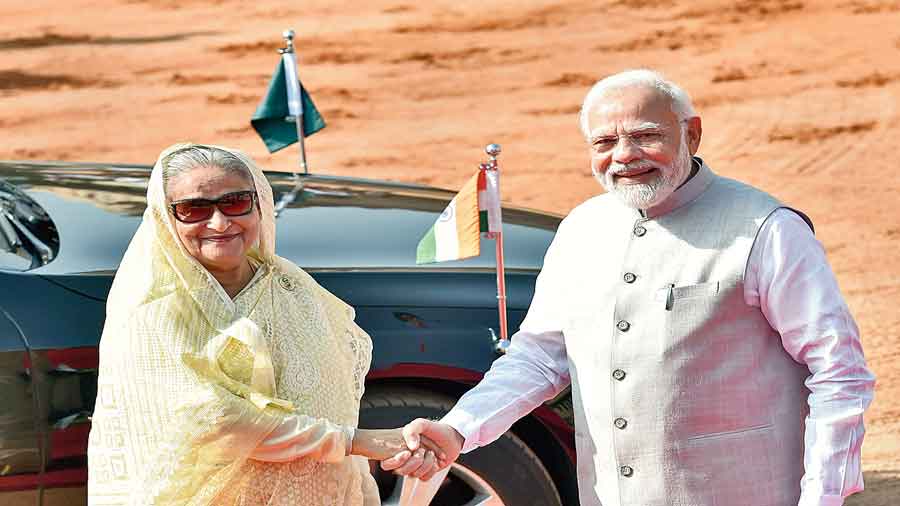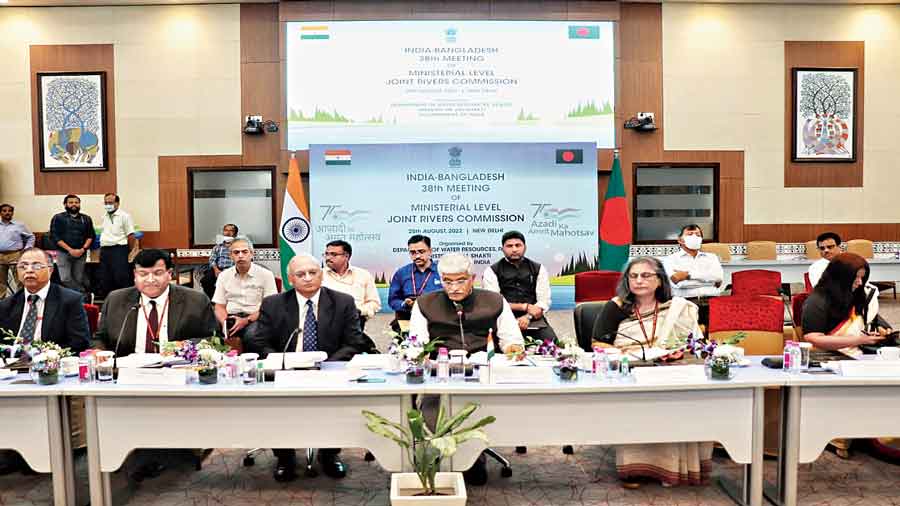India and Bangladesh on Tuesday signed a water-sharing agreement — the first such arrangement since the two countries agreed to share water from the Ganga in 1996 — in the presence of Prime Minister Narendra Modi and his Bangladeshi counterpart Sheikh Hasina.
Prime Minister Hasina reposed faith in the leadership of the Indian Prime Minister in resolving the pending issues, including a much-awaited agreement on the sharing of the Teesta’s waters.
The water-sharing agreement involves a memorandum of understanding (MoU) for the withdrawal of 153cusec water from the Kushiyara river, which flows into the neighbouring country from Assam, at Rahimpur in Sylhet by Bangladesh.
The two sides signed MoUs on six other areas, from cooperation in space technology to collaboration for IT solutions for Bangladesh Railways, and unveiled a host of infrastructure projects on the second day of Hasina’s Delhi visit.
But the water-sharing deal is the biggest takeaway for Hasina as it marks a breakthrough on an issue that has been politically sensitive, not only between the two countries but also within Bangladesh.
Dhaka has since 2011 been waiting for the conclusion of an agreement on sharing the Teesta’s waters, which got stuck because of opposition from Bengal chief minister Mamata Banerjee. Dhaka has also been insisting on a framework for water-sharing from 54 rivers that the two countries have in common.
“I appreciate the visionary leadership of Prime Minister Modiji that continues to provide added momentum to our bilateral relations,” Hasina said in her statement after 90 minutes of delegation-level talks between the two countries at Hyderabad House.
“...I recalled that the two countries have resolved many outstanding issues in the spirit of friendship and cooperation and we hope that all outstanding issues, including the Teesta water-sharing treaty, will be concluded at an early date.”
Although Modi spoke about the Kushiyara breakthrough and how livelihoods in both countries depend on the 54 common rivers, besides touching upon subjects like cooperation in flood mitigation, he did not mention the Teesta in his statement.
The Indian Prime Minister’s silence on the Teesta — a tributary of the Brahmaputra that originates in the Teesta Kangse glacier and flowing through Sikkim and Bengal before entering Bangladesh — is likely to give the Bangladesh Opposition a handle to attack Hasina, who is often criticised for being pro-India.
Bangladesh has always contended that its claim on the Teesta’s waters is legitimate and that it desperately needs its share since about 60 per cent of an estimated 90,000 hectares of land on the river’s banks remain unutilised in the dry season.
Reports from Bangladesh on Tuesday evening suggested that Opposition parties such as the BNP and the Jamaat-e-Islami have already begun talking about the “futility of the visit”. Such a narrative will not only go against Hasina but could affect India’s image in the Muslim-majority country, which has witnessed the rise of fundamentalist forces in the past few years.
The Indian establishment has often been unhappy at Bangladesh’s dalliance with China — especially on infrastructure projects — but Hasina is New Delhi’s preferred choice in Dhaka.
“It is in our interest that her visit to India is seen as a success back home,” a source in India’s foreign policy establishment said.
The Bangladeshi side took care to explain that the agreement on water-sharing from the Kushiyara was a welcome beginning and that they were hopeful of a resolution on the Teesta in the coming days.
At a news conference later in the day, Bangladesh junior foreign minister Shahriar Alam said the relationship between the two countries was not based solely on the logic of “lena-dena (give and take)”.
“On the issue of the Teesta, we think that even if there is some delay, it will be delivered,” he said, lauding the Kushiyara deal as a success.
Economic talks
While Modi’s silence on the Teesta disappointed the visitors, the Indian Prime Minister won accolades for his pledge to begin discussions on another key bilateral issue -- a comprehensive economic partnership agreement (CEPA), which promises to increase bilateral trade.
“Our bilateral trade is growing rapidly. Today, India is the largest market in Asia for Bangladesh’s exports. To further accelerate this growth, we will soon start discussions on the bilateral comprehensive economic partnership agreement,” he said.
Later in the day, Indian foreign secretary Vinay Mohan Kwatra said the discussions would begin soon and were likely to be concluded before 2026, when Bangladesh is expected to graduate from the UN’s Least Developed Countries (LDCs) list.
Multiple sources from both sides said that although the Teesta stalemate hadn’t been resolved — “We were not expecting any resolution during this trip, anyway,” a member of the Bangladeshi delegation said — the outcome of the visit had till now been “positive” for Bangladesh for several reasons.
The most visible reason, the source said, was the Indian Prime Minister’s comments and his gesture of receiving Hasina at Rashtrapati Bhavan on Tuesday.
“The India-Bangladesh relationship will achieve new heights in the coming time(s).... Today, Bangladesh is India’s biggest development partner and our biggest trade partner in the region. There is a continuous improvement in people-to-people cooperation,” Modi said.
He announced his government’s decision to cooperate with Dhaka in IT, space, nuclear sectors, and power generation and transmission.
A Bangladeshi source said the focus of the MoUs was on “capacity building” in Bangladesh, which is a recognition of the country’s ability to grow even faster in the coming days.
Statement wait
For over six hours after Hasina’s meeting with Modi, the release of the joint statement was withheld amid indications that Hasina wanted India to do more for the Rohingya refugees.
On Monday, at a reception hosted by the Bangladesh high commission, she had said that India was a very big country and could do more for the Rohingyas.
Asked about this, Indian foreign secretary Vinay Kawatra acknowledged how much Bangladesh was doing for the Rohingyas by accepting them in large numbers and providing for them, but remained non-committal on her request.












